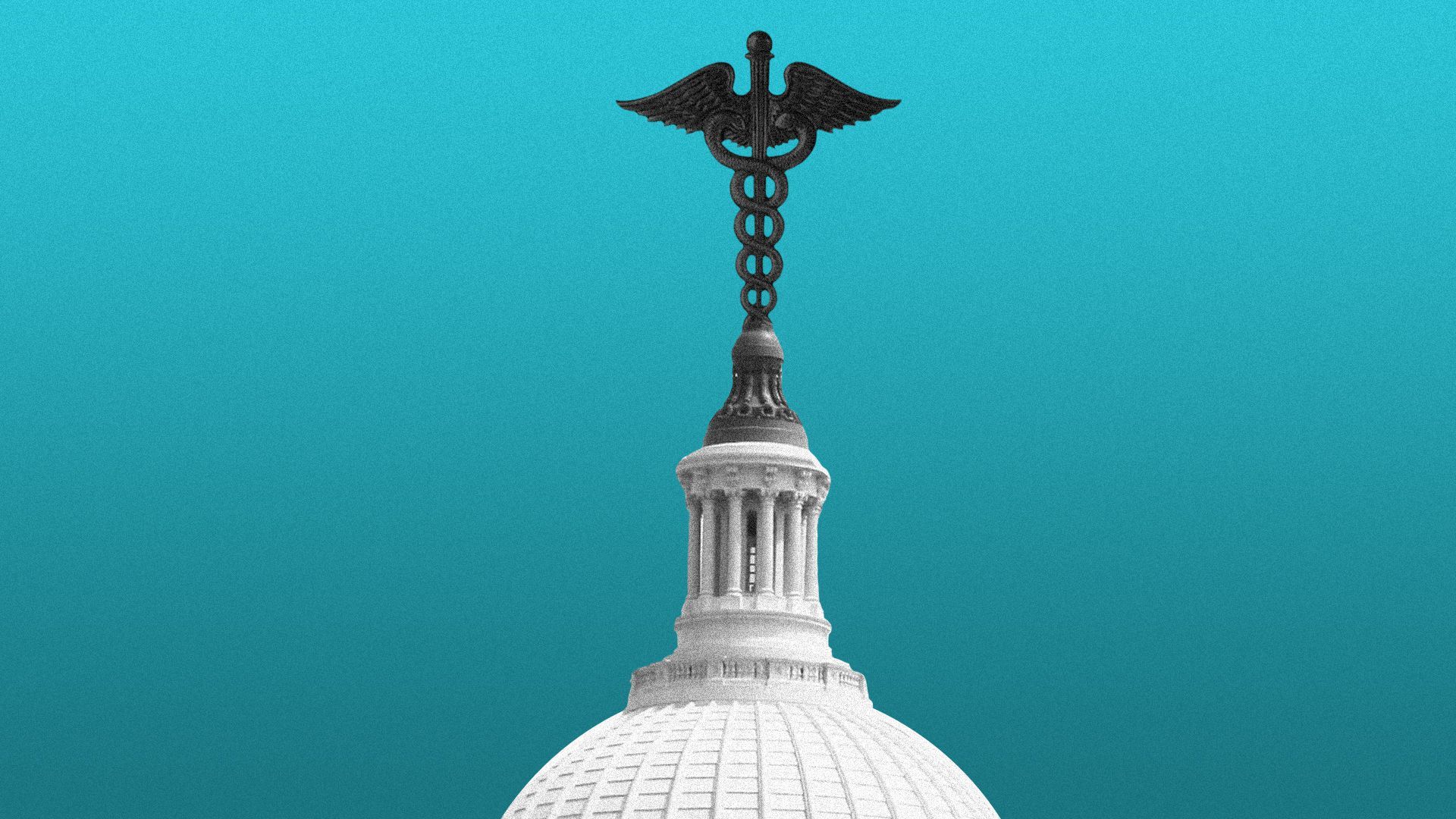| |
| |
| |
| Presented By CVS Health |
| |
| Axios Vitals |
| By Tina Reed · Jan 03, 2023 |
| 🏋️♀️ Welcome back, Vitals readers. We hope you had a happy and healthy holiday season and, if you're making good on resolutions, that you've found a gym that will actually let you in. What to watch: The 2023 International CES kicks off Thursday in Las Vegas. (You'll recall, this is where we've seen health-related products like "smart beds," "smart mirrors" and "smart toilets" debut.) Today's newsletter is 897 words or a 3½-minute read. |
| |
| |
| 1 big thing: America's health care focus shifting in 2023 |
 Data: AP Norc; Chart: Madison Dong/Axios Visuals America appears to be resetting its priorities when it comes to health care as inflation and talk of a recession loom larger on voters' minds, Axios' Adriel Bettelheim and I write. Driving the news: A shrinking percentage of Americans across the ideological spectrum view abortion as a top priority heading into 2023, according to a new poll from the Associated Press-NORC Center for Public Affairs Research. - Independents are the only group that still views health care reform as a top-five issue.
By the numbers: The nationwide poll of 1,124 adults conducted Dec. 1–5 asked what the government should work on in 2023 and found only 11% considered abortion to be a top priority, down from 16% in June. - 18% of Democrats said they considered abortion a priority, down from 23% in June, after a draft opinion striking down Roe v. Wade was leaked. Just 5% of Republicans said abortion was a priority, compared to 9% in June.
- 17% of Americans said they considered health care reform a priority, which is higher than the 6% who thought so in June, but down from 18% in December 2o21.
- Only 5% thought COVID-19 should be a priority, which is hardly changed from June and sharply lower than the 33% who thought so at the same time in December 2021.
Yes, but: 37% put personal financial issues as a pressing matter for 2023, with both Republicans and Democrats responding similarly. The big picture: The reordering of the public's priorities comes after 2½ years of pandemic tumult — and arguably the most consequential burst of health care legislation since the passage of the Affordable Care Act. - There will be more partisan fights over federal funding, the likelihood of a government shutdown in the fall — and regulatory efforts by the Biden administration to further its drug pricing agenda.
Read the rest. |
    |
| |
| |
| 2. What we're watching in Congress |
| The divided Congress may not look like an incubator for much health policy action this year, but there are some areas where lawmakers are at least going to try. Driving the news: There's bipartisan interest in business practices of pharmaceutical benefit managers and any role they may have in rising drug costs for patients. What they're saying: Senate Finance Chairman Ron Wyden (D-Ore.) told Axios' Peter Sullivan before the holiday break that the drug supply chain middlemen will be a focus in 2023. - "I know of people in the House who I think will work with us," Wyden said.
A version of this item was published on Axios Pro. Get news like this by subscribing. Use code POLICY100 which gives you $100 off. |
    |
| |
| |
| 3. Aduhelm probe finds FDA irregularities |
 |
|
| Illustration: Shoshana Gordon/Axios |
| |
| An 18-month congressional investigation found the FDA's approval process for a controversial Alzheimer's drug last year was rife with irregularities, Adriel writes. - Officials didn't follow the agency's own guidance and improperly collaborated with drugmaker Biogen, they found.
Why it matters: The findings, enumerated last week in a report from the House Oversight and Energy and Commerce committees, came amid FDA reviews of two other Alzheimer's drugs that target proteins believed to contribute to the development of Alzheimer's. - While effective new treatments could help millions with the devastating disease, they also raise major questions about who'll cover the costs.
Flashback: The FDA's decision to approve Aduhelm was based on thin evidence, with the FDA's own staff saying it didn't meet the agency's customary standards. What they found: FDA staff and Biogen engaged in at least 115 meetings, calls, and substantive email exchanges surrounding the drug Aduhelm over a 12-month period beginning in July 2019 — interactions that were "atypical" and weren't all properly documented, per the report. 🧠 1 interesting thing: Researchers are fighting Alzheimer's with fitness gadgets |
    |
| |
| |
| A message from CVS Health |
| Healthier happens together |
| |
 |
| |
| No matter who you are, where you are or what you need to take care of your health, CVS Health is there for you. What you need to know: CVS Health connects you to high-quality, convenient and affordable care — whether it's in your community, on your phone or in your home. Learn more. |
| |
| |
| 4. Medical bills flood dispute resolution |
 Data: Centers for Medicare & Medicaid Services; Note: Includes initiating parties or their representatives. For emergency and non-emergency services; Chart: Madison Dong/Axios Visuals Insurers and providers are overwhelming an arbitration system Congress set up to resolve billing disputes as part of the law to prevent surprise medical bills, according to CMS data. Why it matters: The No Surprises Act, which went into effect earlier this year, protected privately insured patients from getting stuck holding the bag when there's a disagreement over the cost of out-of-network care. - But the mechanism for deciding who ultimately pays — which allows providers to appeal out-of-network payments they find unreasonable with a third-party arbitrator — has been bogged down by onerous backlogs.
By the numbers: Federal agencies estimated there would be 17,333 claims a year submitted to the independent dispute resolution process. - CMS data shows, there were more than 90,000 disputes initiated in less than six months.
The big picture: Health insurers lay the blame on some provider groups, especially ones backed by private equity firms, who are abusing the process and overwhelming the system in a way that could increase health care costs. - But providers say since the law took effect, the arbitration process has been skewed in favor of insurers because arbitrators consider factors including the median of contracted rates.
Go deeper. |
    |
| |
| |
| 5. While you were holidaying... |
| 📈 The highly immune evasive Omicron XBB.1.5 variant is quickly becoming dominant in U.S. as it doubles weekly. (CNBC) 🦠 People of color are dying at much higher rates than what COVID data suggests. (USA Today) 👉 Obesity is the second leading cause of preventable death behind smoking, but most doctors don't understand it. (60 Minutes) 💰 Buy now, pay later financing has come to health care. (STAT) |
    |
| |
| |
| A message from CVS Health |
| From the simplest of health needs to more complex care |
| |
 |
| |
| Whether your health needs are simple or more complex, CVS Health is here to connect you to high-quality, convenient and affordable care. In your community, on your phone or in your home, CVS Health delivers care however you need it. Learn more about how we're making healthier happen together. |
| |
| Thanks for reading, and thanks to senior editor Adriel Bettelheim and senior copy editor Bryan McBournie for the edits. Did someone forward this email to you? Here's how to sign up. |
 | | Your personal policy analyst is here. | | |







No comments:
Post a Comment